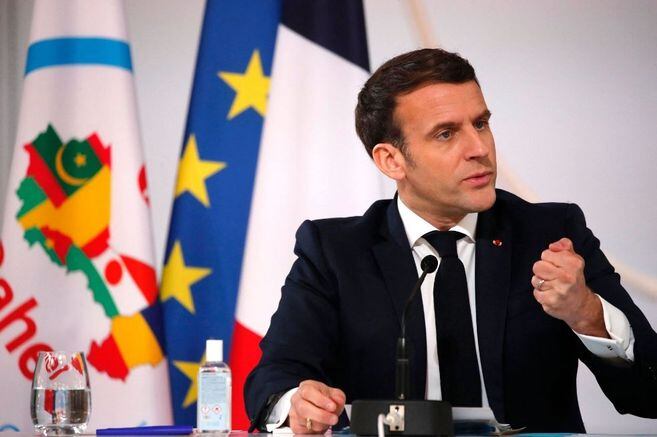
Without a detailed examination of their history and current reality, the Afros lose capacity for integration into society. In France, however, they see the autopsy as a “threat.”
Emmanuel Macron’s government has taken such a sharp turn to the right that it has even stunned representatives of the National Grouping (RN), the party that abandons the far right in France.
Last week, French Interior Minister Gerald Dramanin suggested in a televised debate that RN leader Marine Le Pen was very “soft” in the face of radical Islam. Le Pen’s expression after the comment came as a total surprise. That Darmanin accused her – the speech is well known for being populist and xenophobic – of not being strong against Islam speaks of how the Executive has also fed on extremist positions to please the more conservative electorate in the face of the presidential elections of 2022.
In October 2020, Macron declared war on “Islamist separatism,” as the president dubbed it “Islam’s attempts to dominate parts of the national territory and go against France.” This was sweet news for Islamophobia. Through the anti-separatism bill he introduced and passed on Tuesday, the president wants to reconfigure the practices of Islam in his nation to fit his vision of a “French Islam” that he supposedly reaffirms. the “republican principles of France.” His goal, he explains, is to fight radical Islam and terrorism in this way, but the only thing that ends up doing this project is to increase the stigma, hate speech and oppressive and authoritarian climate that Macron has unleashed.
We recommend: France passes law to combat Islamist radicalism
It should be remembered that Macron also introduced the Global Security Bill which sought to prevent the public from registering abuses by the police. France faces an extreme control apparatus that Macron has tried to install on the pretext that it is best to protect “republican principles,” such as freedom. And although the French have spoken out against these government measures, the president’s cabinet continues to put its finger on the sore. The latest controversy came from the Minister of Higher Education, Frederique Vidal, who intends to control studies on racism in France.
Demonstrations against systemic racism in the United States, following the death of George Floyd in 2020, resonated in France, where an attempt has been made to ignore this problem. For some years now, the United States, a country built on the basis of racism and slavery like France, has been discussing the implications of its past for today’s society. . It is worth noting, for example, the autopsy carried out by the 1619 Project, which focuses on the consequences of slavery in the country and seeks to integrate into schools. But these American initiatives have not been well interpreted by Vidal and Macron’s team, who have called them “a threat.”
Macron’s fight with “Islamic separatism,” explained
The concept of “race” in France is a taboo that, for various politicians like Macron, seeks to “split the republic in two” between victims and culprits. Vidal understands this as well, so he has called for an investigation into those who “look mostly through the prism of the fractured vulture.” By this he meant researchers examining French colonialism and racism, whom he also called “activists.” “Research will determine what research is and what activism and opinion is,” Vidal concluded.
This effort by the Ministry of Higher Education to control the examination of French colonialism and to accuse American universities of “promoting dangerous leftist ideas” worries Afro academics like Mami-Fatou Niang, who points out that minority researchers have been considered activists over the centuries, and this will only put them under more scrutiny. On the other hand, he has warned that this “purge at the academy” would cause a brain drain.
“French higher education has an excellent reputation in US doctoral schools. USA where very strong, knowledgeable and serious researchers would be trained. Undoubtedly, bleeding and brain drain will increase with such actions. “That is their goal. To evacuate critical thinking,” says Niang, who has been attacked by French lawmakers for alleged “ideological excesses.”
France has always had a problem with the history of its colonialism. It is as sensitive an issue as slavery is to the United States. And that translates into a huge problem for minorities. The French government, unlike other Western nations, does not formally maintain statistics on race or religion, for example. But one cannot have a conversation about inequality without understanding race, its history, and its context. Without a detailed examination of their past and current reality, afros lose capacity for integration into society.
“It is the inability to shed light on this past that maintains the racism and impunity of the police, or the impunity of decision makers, in employment or housing, based on physical criteria, and denying rights. of the French who are black or Arab, “said Karfa Diallo, a Senegalese-born founder of Mémoires et partagés in The New York Times.
In French universities, some academics formed a group known as the “Observatory on Decolonialism and Identity Ideologies” with the aim of confronting what they consider an “unhealthy approach to race and identity in the world.” academic “. But all these initiatives face the reluctance of a government to examine its mistakes while flirting with far-right voters, who like this story not to be examined, and pass laws to protect the smell of manure. rather than measures to review systemic racism.
You may be interested in: Afros are also attacked in France